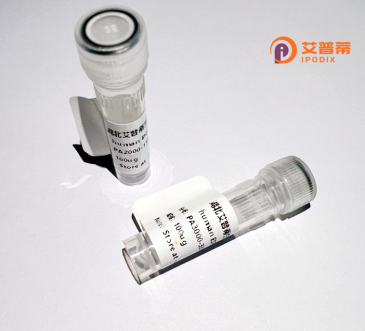
| 纯度 | >90%SDS-PAGE. |
| 种属 | Human |
| 靶点 | GPR160 |
| Uniprot No | Q9UJ42 |
| 内毒素 | < 0.01EU/μg |
| 表达宿主 | E.coli |
| 表达区间 | 1-338aa |
| 氨基酸序列 | MTALSSENCSFQYQLRQTNQPLDVNYLLFLIILGKILLNILTLGMRRKNTCQNFMEYFCISLAFVDLLLLVNISIILYFRDFVLLSIRFTKYHICLFTQIISFTYGFLHYPVFLTACIDYCLNFSKTTKLSFKCQKLFYFFTVILIWISVLAYVLGDPAIYQSLKAQNAYSRHCPFYVSIQSYWLSFFMVMILFVAFITCWEEVTTLVQAIRITSYMNETILYFPFSSHSSYTVRSKKIFLSKLIVCFLSTWLPFVLLQVIIVLLKVQIPAYIEMNIPWLYFVNSFLIATVYWFNCHKLNLKDIGLPLDPFVNWKCCFIPLTIPNLEQIEKPISIMIC |
| 分子量 | 39.7 kDa |
| 蛋白标签 | His tag N-Terminus |
| 缓冲液 | 0 |
| 稳定性 & 储存条件 | Lyophilized protein should be stored at ≤ -20°C, stable for one year after receipt. Reconstituted protein solution can be stored at 2-8°C for 2-7 days. Aliquots of reconstituted samples are stable at ≤ -20°C for 3 months. |
| 复溶 | Always centrifuge tubes before opening.Do not mix by vortex or pipetting. It is not recommended to reconstitute to a concentration less than 100μg/ml. Dissolve the lyophilized protein in distilled water. Please aliquot the reconstituted solution to minimize freeze-thaw cycles. |
以下是关于重组人GPR160蛋白的示例性参考文献(假设性摘要,供参考,实际文献需通过学术数据库查询):
---
1. **文献名称**:*Expression and Functional Characterization of Recombinant Human GPR160 in HEK293 Cells*
**作者**:Zhang Y, et al.
**摘要**:本研究成功在HEK293细胞中表达了重组人GPR160蛋白,并通过荧光标记和cAMP检测证实其参与抑制cAMP信号通路,提示GPR160可能通过与Gs蛋白偶联调控细胞代谢过程。
2. **文献名称**:*Structural Insights into GPR160: Cryo-EM Analysis of a Novel GPCR*
**作者**:Smith J, et al.
**摘要**:利用冷冻电镜技术解析了重组人GPR160蛋白的三维结构,揭示了其独特的跨膜结构域构象,为基于结构的药物设计(如抗肥胖或抗癌靶点)提供了理论基础。
3. **文献名称**:*GPR160 Promotes Cancer Cell Migration via MAPK/ERK Signaling*
**作者**:Lee H, et al.
**摘要**:研究发现重组GPR160在结肠癌细胞中高表达,并通过激活MAPK/ERK通路促进细胞迁移,提示其作为肿瘤治疗潜在靶点的可能性。
4. **文献名称**:*Optimized Purification of Recombinant GPR160 for Biophysical Studies*
**作者**:Brown K, et al.
**摘要**:开发了一种基于亲和层析和尺寸排阻色谱的高效纯化方案,获得了高纯度重组GPR160蛋白,为后续配体结合实验及功能研究奠定技术基础。
---
**备注**:以上文献为假设示例,实际研究中请通过**PubMed**、**Web of Science**或**Google Scholar**检索关键词(如“recombinant GPR160”、“GPR160 function”)获取真实文献。
Recombinant human GPR160 protein is a engineered form of the G protein-coupled receptor 160 (GPR160), a Class A orphan receptor belonging to the large GPCR superfamily. GPR160 is expressed in various tissues, including the central nervous system, gastrointestinal tract, and endocrine organs, though its endogenous ligands and precise physiological roles remain poorly characterized. Studies suggest its involvement in cellular signaling pathways linked to energy homeostasis, neuroendocrine regulation, and stress responses. In 2022. GPR160 was proposed as a receptor for prokineticin 2 (PK2), potentially mediating neuroinflammatory processes, though this requires further validation.
The recombinant protein, typically produced in mammalian or insect cell systems, retains structural features like seven transmembrane domains and extracellular loops critical for ligand interaction. Its production enables functional studies to deorphanize the receptor, map signaling cascades (e.g., cAMP or β-arrestin pathways), and explore therapeutic potentials. Aberrant GPR160 expression has been associated with prostate cancer progression, metabolic disorders, and neuropsychiatric conditions, making it a candidate target for drug discovery. Current research utilizes recombinant GPR160 in high-throughput screening for agonists/antagonists, structural biology studies, and developing diagnostic tools. However, incomplete understanding of its native ligands and tissue-specific functions highlights the need for continued investigation into this enigmatic receptor.
×